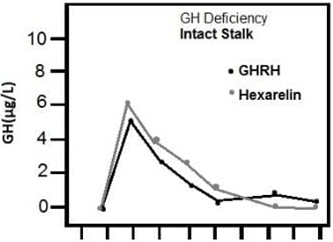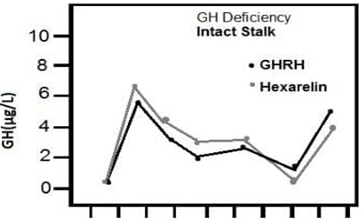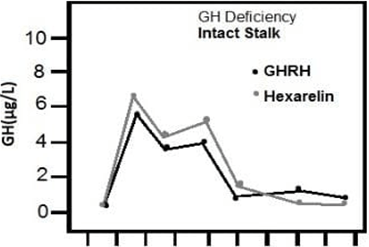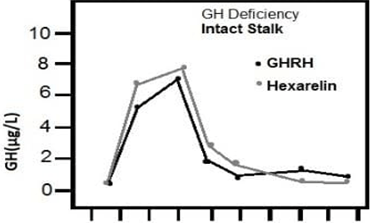This set of Molecular Endocrinology Multiple Choice Questions & Answers (MCQs) focuses on “Neuroendocrine Disease – Set 2”.
1. What is the principal cause of hGH deficiency in children with idiopathic dwarfism?
a) GHRH deficiency
b) GnRH deficiency
c) ADH deficiency
d) ACTH deficiency
View Answer
Explanation: The main cause of hGH deficiency in children with idiopathic dwarfism tends to be GHRH deficiency. This disorder is often related to irregular electroencephalograms. Idiopathic short stature (ISS) is defined as a condition characterized by a height greater than 2 standard deviations for a given age, sex and population below the corresponding mean height, without disease findings.
2. Which among the following is the graph that shows Children with GH deficiency and an intact vascular pituitary stalk as visualized by dynamic magnetic resonance imaging?
a)

b)

c)

d)

View Answer
Explanation: Differentiating between primary pituitary disease and GHRH deficiency by normal GH reserve tests can be difficult. Children with GH deficiency and an intact vascular pituitary stalk displayed a strong yet blunted GH response to both secretagogues, as visualized by dynamic magnetic resonance imaging.
3. Which among the following is an example of a gene encoding GHRH receptor that is responsible for a sizable proportion of congenital hypothalamic-pituitary disorders?
a) HVL7
b) CLB3
c) PIT1
d) SNF7
View Answer
Explanation: Studies have identified structural and regulatory genes, including the genes encoding the GHRH receptor, with autosomal recessive mutations. These genes are responsible for a large proportion of congenital hypothalamic-pituitary disorders once considered idiopathic and they include, PIT1, PROP1, HESX1, LHX3, and LHX4.
4. Isolated ACTH deficiency is uncommon in hypothalamic diseases.
a) True
b) False
View Answer
Explanation: Another manifestation of hypothalamic dysfunction is adrenal insufficiency, and CRH deficiency rarely affects this. Isolated ACTH deficiency is rare, but there is tentative evidence of genetic linkage to the CRH gene locus in at least one family.
5. Pituitary hypersecretion can also occur with paraneoplastic syndromes.
a) True
b) False
View Answer
Explanation: Paraneoplastic syndromes may also cause pituitary hypersecretion, although they do not originate from the hypothalamus. This is same as in bronchial and pancreatic CRH-secreting tumors and GHRH secreting tumors.
6. Mutations in which among the following gene is associated with the majority of cases of isolated ACTH deficiency in neonates?
a) PIT1
b) TBX19
c) PROP1
d) HESX1
View Answer
Explanation: Mutations in TBX19 are associated with most cases of isolated neonate ACTH deficiency. This is the TPIT encoding gene, a transcription factor of the T-box which is only expressed in pituitary corticotrophs and melanotrophs.
7. What is the most common pediatric tumor occurring in the sellar and parasellar area?
a) Craniopharyngioma
b) Lympho-myeloma
c) Decatheronekosis
d) Ascites
View Answer
Explanation: The most common pediatric tumor that occurs in the sellar and parasellar region is craniopharyngioma. These benign neoplasms typically cause severe neuroendocrine dysfunction because of their location.
8. Which among the following conditions can cause precocious puberty?
a) Myeloma
b) Ascites Lymphoma
c) GHRH-secreting gangliocytoma
d) GnRH-secreting hamartomas
View Answer
Explanation: Occasionally, pituitary hypersecretion is caused by hypothalamus tumors. GnRH-secreting hamartomas can cause precocious puberty. Idiopathic short stature (ISS) is defined as a condition characterized by a height greater than 2 standard deviations for a given age, sex and population below the corresponding mean height, without disease findings.
9. Which among the following conditions can cause Cushing’s syndrome?
a) CRH-secreting gangliocytoma
b) GnRH-secreting hamartomas
c) GHRH-secreting gangliocytoma
d) Ascites Lymphoma
View Answer
Explanation: CRH-secreting gangliocytomas may cause Cushing’s syndrome. This is an example of the pituitary disorder due to tumors in the hypothalamus. When the body is exposed to elevated levels of the hormone cortisol for a long time, Cushing syndrome occurs.
10. Which among the following conditions can cause acromegaly?
a) GnRH-secreting hamartomas
b) GHRH-secreting gangliocytoma
c) CRH-secreting gangliocytoma
d) Ascites Lymphoma
View Answer
Explanation: GHRH-secreting gangliocytomas in hypothalamus may cause acromegaly. Acromegaly is a hormonal condition that occurs when too much growth hormone is released by your pituitary gland during adulthood.
11. Which among the following is an example of a disease that occurs due to Neuroendocrine Disorders of Gonadotropin Regulation?
a) Precocious Puberty
b) Pernicious anemia
c) UTI
d) Endometriosis
View Answer
Explanation: When physiologically normal pituitary-gonadal function occurs at an early age, the term precocious puberty is used. It is known as the onset before the age of 9 or 10 years of androgen secretion and spermatogenesis in boys or the onset before the age of 7 or 8 in estrogen secretion and cyclic ovarian activity in girls.
12. What is the disease caused due to premature sexual development resulting from excessive secretion of androgens, estrogens, or hCG?
a) Pseudoprecocious puberty
b) Precocious Puberty
c) Acromegaly
d) Kwashiorkor
View Answer
Explanation: The term Pseudoprecocious puberty refers to premature sexual growth resulting from excessive androgen, estrogen, or hCG secretion. It is caused by tumors that are (both gonadal and extragonadal).
13. Which among the following is an exception to the generalization that tumors of the brain cause precocious puberty?
a) Hamartoma of the hypothalamus
b) CRH-secreting gangliocytoma
c) GHRH-secreting gangliocytoma
d) Pseudoprecocious puberty
View Answer
Explanation: Hypothalamus hamartoma is an exception to the generalization that brain tumors cause precocious puberty by gonadotropin secretion impairment. A tumor-like array of normal-appearing nerve tissue found in an irregular position is a hamartoma.
14. Which among he following is a disease which consists of paralysis of upward gaze, pupillary areflexia that occurs with about half of patients with pinealoma?
a) Parinaud’s syndrome
b) Hamartoma of the hypothalamus
c) Craniopharyngioma
d) Pineocytoma
View Answer
Explanation: Parinaud’s syndrome, consisting of upward gaze paralysis, pupillary areflexia (to light), convergence paralysis, and wide-based gait, occurs in around half of patients with pinealoma. Because of brain stem or cerebellar compression, gait disruptions may also happen.
15. Which among the following are the most common tumors of the pineal gland?
a) Germinomas
b) Parinaud’s syndrome
c) Pineocytoma
d) Craniopharyngioma
View Answer
Explanation: In fact, germinomas (a type of teratoma), so named because of their presumed origin in germ cells, are the most common tumors of the pineal gland. Germinomas of the anterior hypothalamus may also occur in some cases.
Sanfoundry Global Education & Learning Series – Molecular Endocrinology.
To practice all areas of Molecular Endocrinology, here is complete set of 1000+ Multiple Choice Questions and Answers.
If you find a mistake in question / option / answer, kindly take a screenshot and email to [email protected]
